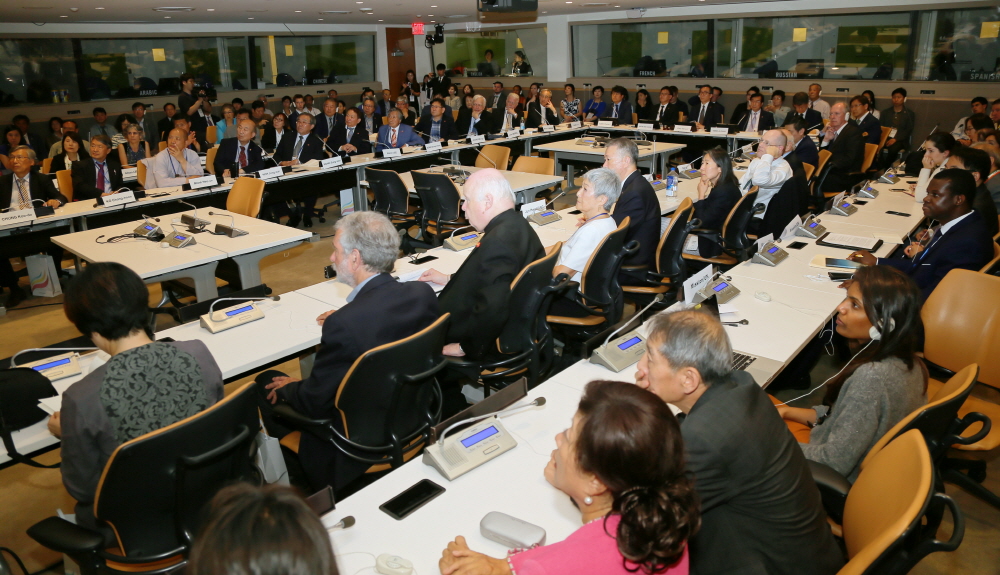 The U.N. Symposium on Human Rights and Jeju 4·3: Jeju 4·3, Truth, Responsibility, and Reconciliation
The U.N. Symposium on Human Rights and Jeju 4·3: Jeju 4·3, Truth, Responsibility, and Reconciliation
Special Article I
On June 20 at 3 p.m. (EST) in Conference Room 11 at the U.N. Headquarters in New York City, United States of America, the U.N. Symposium on Human Rights and Jeju 4·3 was hosted by the Permanent Mission of the Republic of Korea to the United Nations (Representative Cho Tae-yul). The symposium was organized by the Jeju Special Self-Governing Province (Governor Won Heeryong), the office of Korean National Assemblyman Kang Chang-il, and the Jeju 4·3 Peace Foundation (President Yang Jo Hoon).
Arranged by Kwon Heon-gyu, Jeju 4·3 Peace Foundation Research Department
Photography by Kang Jeong-hyo
The U.N. symposium under the theme Jeju 4·3, Truth, Responsibility, and Reconciliation was successfully held with human rights and peace-related groups from South Korea and the United States in attendance. On the day of the event, the air in New York City was charged with humidity due to the wet weather that lasted nearly a week. It was a sultry late summer afternoon. Nevertheless, reflecting the heat of the 200 people who had applied to enter the conference room that accommodated only 130 people, many participants visited two hours earlier than the event at the Permanent Mission of the Republic of Korea to the United Nations to receive the access pass to the U.N. Headquarters.
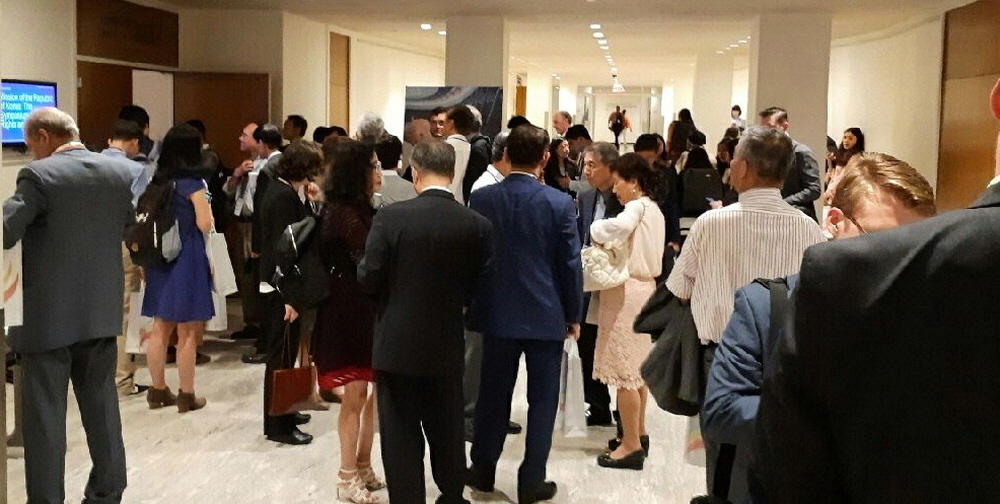
Entrance to the symposium.
The space in front of Conference Room 11 on the basement floor of the U.N. Headquarters was literally packed with members of the organizing entities (the Jeju Special Self-Governing Province, the office of Korean National Assemblyman Kang Chang-il, the Jeju 4·3 Peace Foundation, the Jeju Special Self-governing Provincial Council, the Provincial Office of Education, and the Association for the Jeju 4·3 Bereaved Families) who had arrived in New York late in the evening of June 18 (local time), along with those from the U.S.-based cooperating groups that had previously met with the delegation from Jeju in April. The 3-hour symposium started 30 minutes late since a prior event held in the same conference room ran long. In the welcoming speech after a silent tribute was paid to the lost souls of Jeju 4·3 and an introductory video feed, Cho Tae-yul, the permanent representative of the Republic of Korea to the United Nations, mentioned his visit to a village in Columbia scarred by civil war.
“We were too vulnerable to keep peace, and wounds to our spirits are too deep to overcome. This is why the process of healing and reconciliation taking place in Jeju will lead to the entire world,” Representative Cho said, adding that this symposium shall become “an opportunity to prevent the recurrence of tragedy, heal our past wounds, and show our will to promote peace and human rights all across the world.”
Greetings from Jeju Governor Won and National Assemblyman Kang, who were unable to attend, were followed by the words of Jeju 4·3 Peace Foundation President Yang. President Yang stated that numerous activists made concerted efforts to build solidarity and keep memories of Jeju 4·3 for 71 years, which finally brought the issue to the conference in New York.
Yang also said: “The tragedy we endured during 4·3 is the fault of both the governments of the United State and South Korea. While the presidents of the Korean government apologized three times for the country’s misuse of authority, the United States keeps silent without any comment at all. We appeal to American intellectuals and media.”
In his keynote speech, Bishop Peter Kang Woo-il spoke of the historical and social background of Jeju 4·3 and argued the responsibility of the U.S. Military Government in Korea.
“The wrongful acts committed by the U.S. military government and the South Korean government are to be clarified among the international community, which will contribute to achieving the ultimate goal of justice, responsibility and reconciliation,” Bishop Peter said.
Presenters from different fields also shed light on the truth of the tragedy and the responsibility of the United States from their own areas of expertise, offering visions toward a peaceful future.
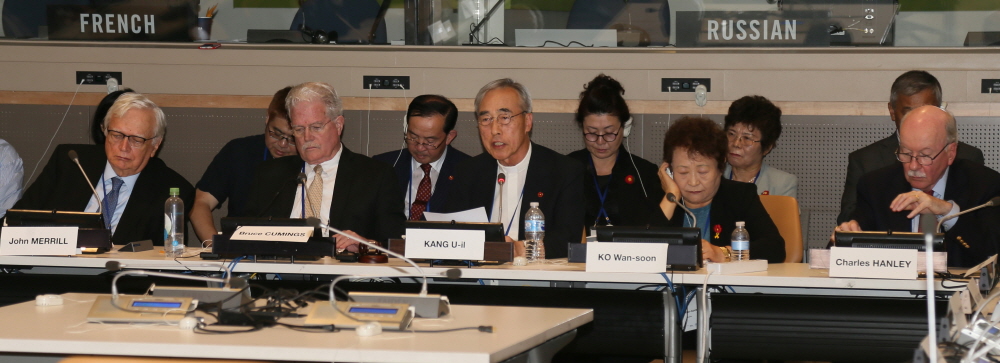
Presenters (from the left) John Merrill, Bruce Cumings, Kang Woo-il, Ko Wan-soon and Charles Hanley.
Bruce Cumings, a distinguished professor at the University of Chicago, discussed the responsibility of the United States in the mass killings from the perspective of history, while John Merrill, former chief of the Northeast Asia Division in the U.S. Department of State, mentioned the misunderstandings of the U.S. government about Korea that were reflected in its foreign policy toward Korea and its resulting tragedy of Jeju 4·3.
Charles Hanley, former deputy managing editor of the Associated Press who won the Pulitzer Prize for his coverage on No Gun Ri massacre, revealed the fact that the U.S. authority had concealed Jeju 4·3 and contemporaneous English-language media had remained indifferent about the incident. Professor Baik Tae-ung, member and vice-chair of the U.N. Human Rights Council Working Group on Enforced or Involuntary Disappearances, provided an analysis on Jeju 4·3 from an international law perspective.
What drew attention from the U.N. officials, co-op groups and participants from outside Korea was the testimonial speech of Ko Wan-soon, a survivor of the Bukchon Village Massacre and a bereaved family member of Jeju 4·3. Many participants’ eyes reddened as Ko spoke of the arson of her village and the massacre of her villagers that took everything from her as a little girl who was once curious and full of dreams, and the hardships that has persisted her entire life.
“As is the purpose of the United Nations, I request the United States of America to actively partake in settling the truth of 4·3,” Ko said, concluding her testimony to a round of applause.
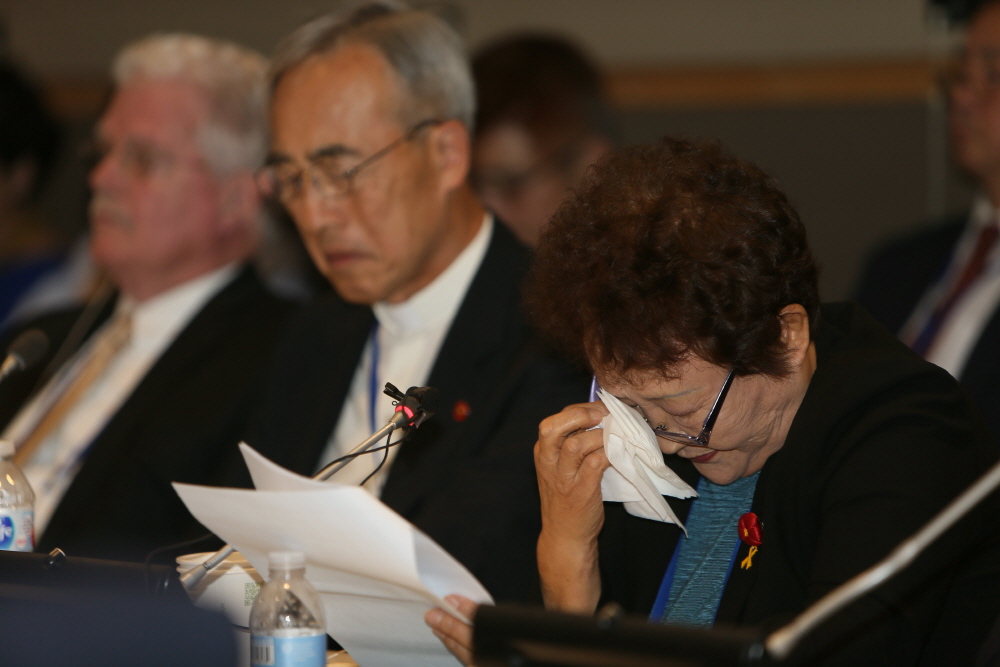
Lady Ko sheds tears while giving her testimony as Bishop Kang Woo-il looks on.
Discussions that followed were also insightful. Remarkable suggestions included that the United States should conduct a fact-finding mission with respect to its responsibility and that an additional symposium should be held in Washington, D.C., to push ahead with further investigations.
Meanwhile, Jeju high school students Jeong Hyeon-seo (Daejeong High School) and Kang Hye-min (Shinseong Girls’ High School) received a big hand as they said, “many citizens can be as mature as Moon Hyeong-soon, chief of Seongsanpo Police Station, who chose justice in a moment of crisis, and our society can be more just if we are properly educated to sympathize with the spirit of 4·3.”
Professor Park Myung-lim, moderator of the symposium and executive director of the Kim Dae-jung Presidential Library at Yonsei University, made a surprise proposal for the people of Jeju Island to be nominated for the Nobel Peace Prize, saying the movement of peace and reconciliation involving Jeju 4·3 surpasses the barriers between perpetrators and victims, civilians and government, liberals and conservatives, and is being renewed as a symbol for reconciliation, coexistence, tolerance and mercy.
Though the event was 3 hours long without a break, the air in the crowded hall with all the 130 seats taken was as just as hot as the weather outside. Meanwhile, outside of the conference room, copies of The JEJU 4·3 Mass Killing: Atrocity, Justice, and Reconciliation, a collection of papers written in English, were distributed along with sourcebooks for the symposium. U.N. officials and representatives who failed to attend the symposium showed keen interest in the book and kept copies for themselves.
Also, during the reception held at the Permanent Mission of the Republic of Korea to the United Nations after the symposium, more than 200 influential figures attended, including Charles Rangel, the second-longest serving incumbent member of the House of Representatives at the time of his retirement in 2017, and Thomas Byrne, president of the Korea Society, who bridged South Korea and the United States in diplomacy. The reception was a venue where the hope that Jeju 4·3 can act as an opportunity to spread the spirit of reconciliation across the world and that the KOR-U.S. can maintain strong relations on a foundation of justice were fostered.
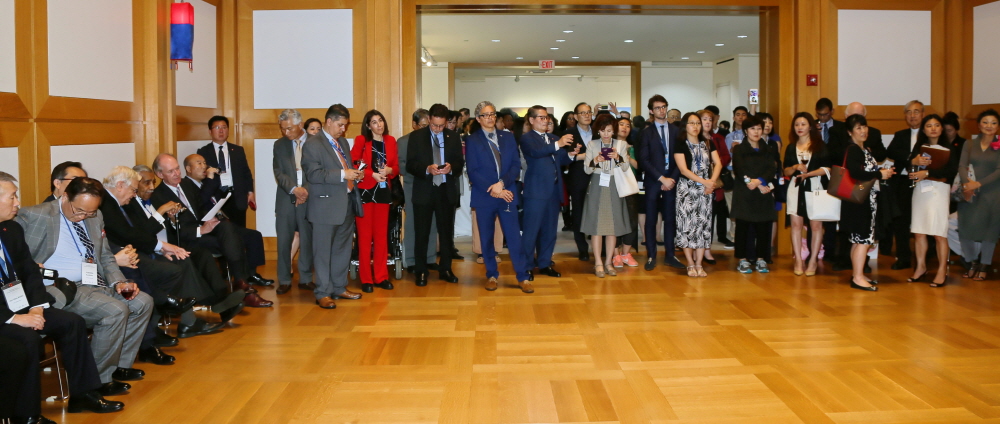
About 200 people took part in the reception held in the Permanent Mission of the Republic of Korea to the United Nations.
The U.N. Symposium on Human Rights and Jeju 4·3 was meaningful in that it alerted the world to the truth of Jeju 4·3 at the U.N. Headquarters and pushed for the United States to take responsibility. Also, since the beginning of its preparation in the second half of 2018, 38 cooperating groups have been secured, 14 of which are in the United States. This will have a profound impact on propelling the claim that the United States should take responsible actions regarding the incident. The symposium also publicized the idea to establish a Korean-American 4·3 Commemoration Agency by the Korean-American societies, including the Jejudo Association of America (New York), which was an unexpected outcome.
The symposium, which gravely handled the issue of the U.S. Military Government in Korea’s responsibility, built a solidarity for cooperating groups, and offered Koreans in America to sympathize with their Jeju compatriots. These various results indicate that this first symposium was a success. Follow-up tasks include maintaining openings for similar symposiums in Washington, D.C., to bring up the issue of U.S. responsibility while securing more evidence through future investigations. More proactive international efforts are required to reach the ultimate resolution to Jeju 4·3.
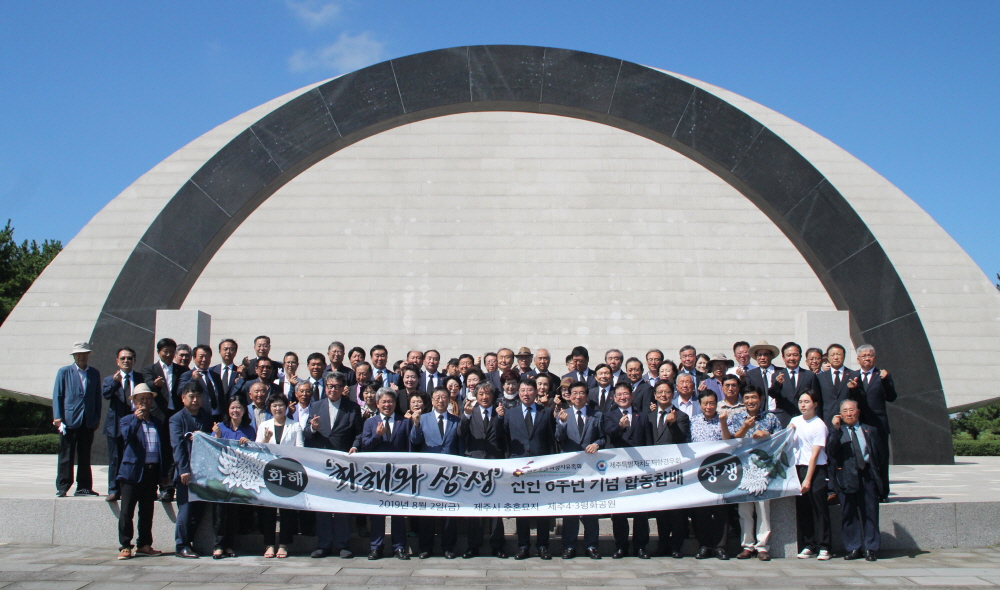 Jeju 4.3 was a historic incident symbolizing national integration
Jeju 4.3 was a historic incident symbolizing national integration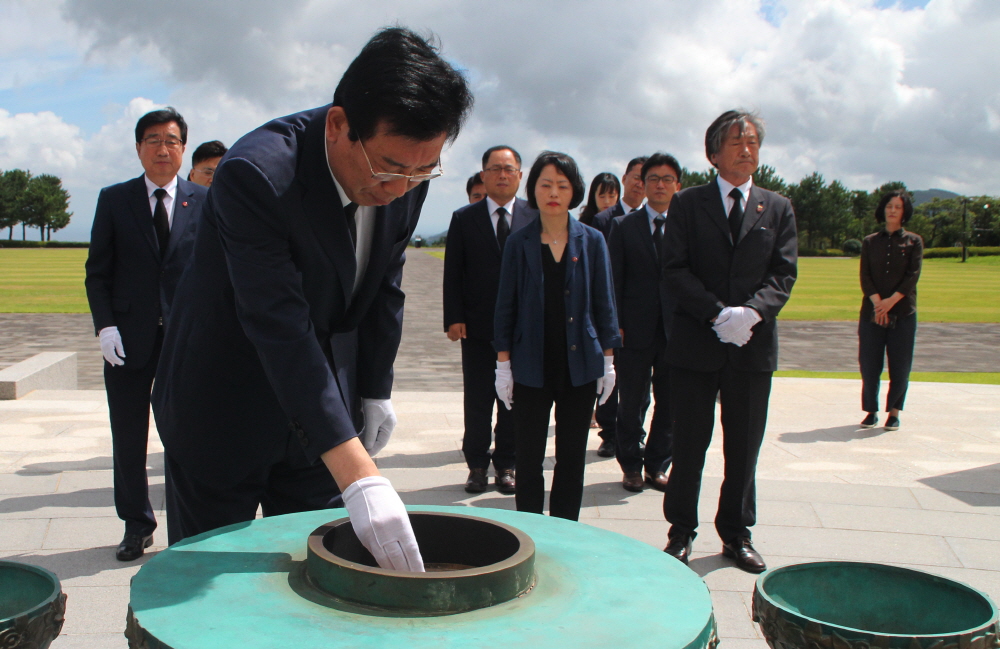 On Aug. 8, 2019, high officials from the Jeju District Public Prosecutors’ Office paid visits to the joint worship, including Jo Jae-yeon, Director of the Office, and Park So-young, Deputy Chief Prosecutor, both new on Jeju, as well as Kim Jae-ha, Jeong Tae-won, and Park Dae-beom, Chief Prosecutors.
On Aug. 8, 2019, high officials from the Jeju District Public Prosecutors’ Office paid visits to the joint worship, including Jo Jae-yeon, Director of the Office, and Park So-young, Deputy Chief Prosecutor, both new on Jeju, as well as Kim Jae-ha, Jeong Tae-won, and Park Dae-beom, Chief Prosecutors.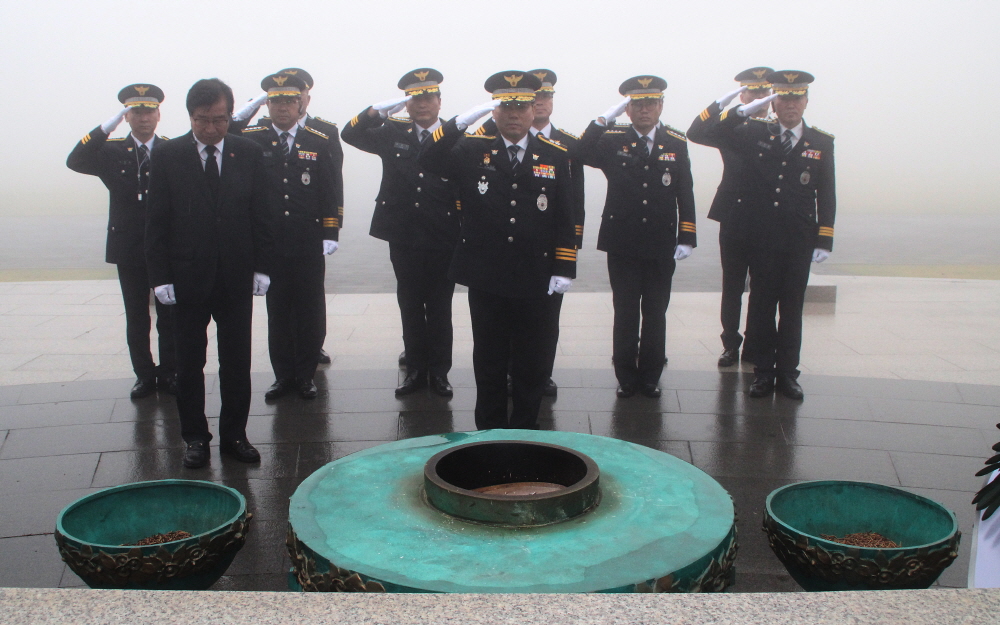 Kim Byeong-goo, Chief of the Jeju Provincial Police Agency, visited the memorial altar in the Jeju 4‧3 Peace Memorial Park on Oct. 18 along with 14 members of the provincial police agency staff including Byeon Min-seon, Chief of the Investigation Division, Seo Sang-tae, Chief of the Criminal Investigation Division, and Kim Hak-cheol, Chief of the Security Division.
Kim Byeong-goo, Chief of the Jeju Provincial Police Agency, visited the memorial altar in the Jeju 4‧3 Peace Memorial Park on Oct. 18 along with 14 members of the provincial police agency staff including Byeon Min-seon, Chief of the Investigation Division, Seo Sang-tae, Chief of the Criminal Investigation Division, and Kim Hak-cheol, Chief of the Security Division.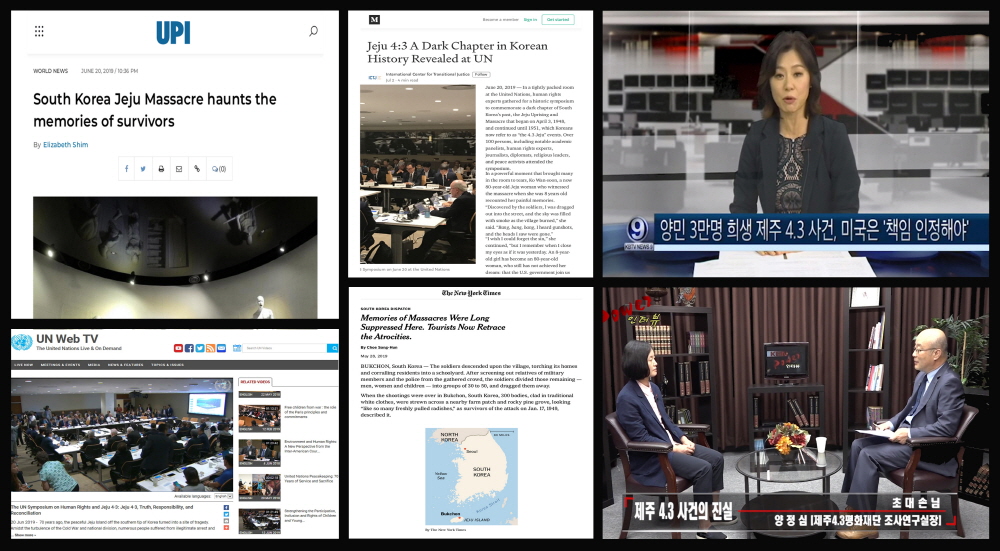 Full-scale articles in UPI, The New York Times, and U.N. Web TV broadcast reflect the growing global attention to the Incident
Full-scale articles in UPI, The New York Times, and U.N. Web TV broadcast reflect the growing global attention to the Incident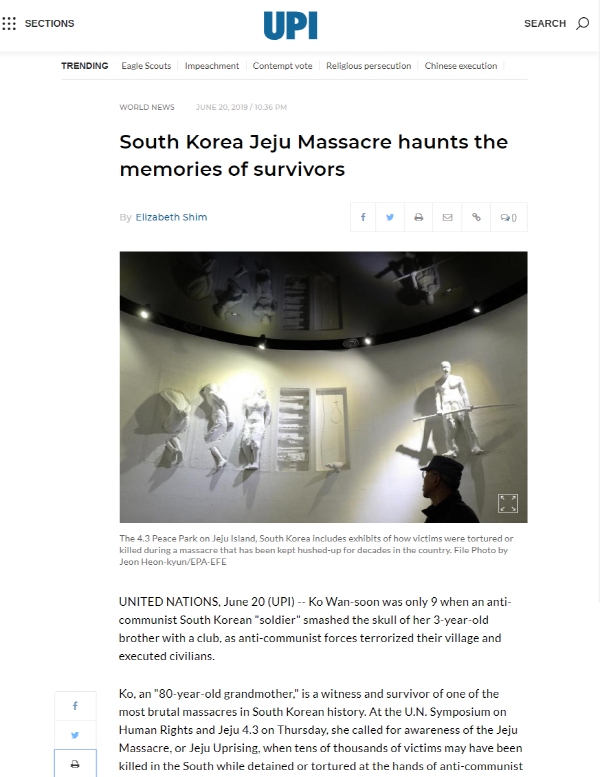 In the article, Bruce Cumings, a renowned historian and a distinguished service professor of history at the University of Chicago, is paraphrased as having said that during the event the U.S. military, which had operational control of the South’s security forces following Japan’s surrender, play a role in the massacre.
In the article, Bruce Cumings, a renowned historian and a distinguished service professor of history at the University of Chicago, is paraphrased as having said that during the event the U.S. military, which had operational control of the South’s security forces following Japan’s surrender, play a role in the massacre.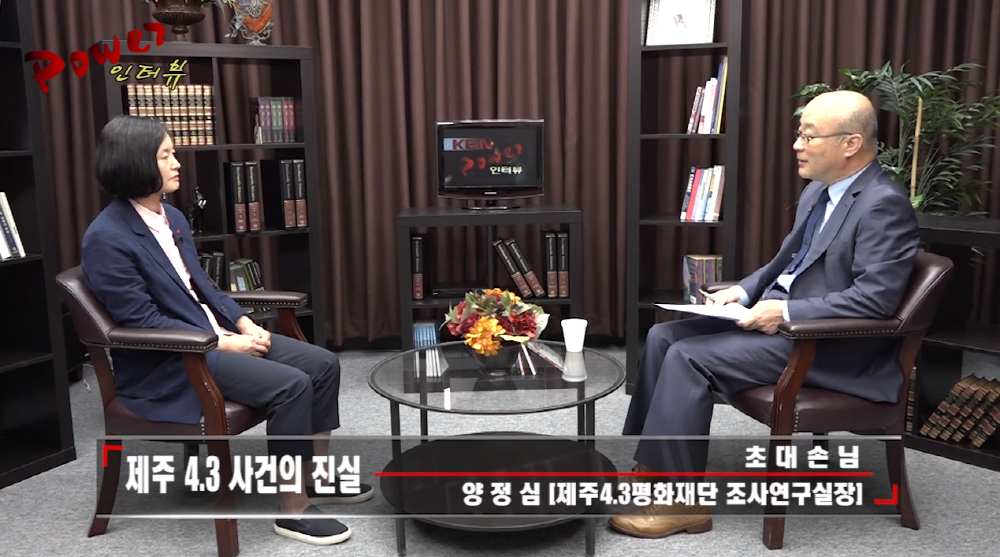 Korea Broadcasting TV (KBTV), a Korean broadcast channel in New York, provided two news pieces: Lifting the veil over Jeju 4·3 Incident involving 30,000 residents as victims at UN, and The U.S. should admit its responsibility on Jeju 4·3 Incident where 30,000 innocents were massacred. The Korea Broadcasting Network (KBN) News in New York made an in-depth report with an interview with Yang Jeong-sim from the Jeju 4·3 Peace Foundation in its show Power Interview, examining the truth of Jeju 4·3 Incident and the results of the U.N. symposium in detail.
Korea Broadcasting TV (KBTV), a Korean broadcast channel in New York, provided two news pieces: Lifting the veil over Jeju 4·3 Incident involving 30,000 residents as victims at UN, and The U.S. should admit its responsibility on Jeju 4·3 Incident where 30,000 innocents were massacred. The Korea Broadcasting Network (KBN) News in New York made an in-depth report with an interview with Yang Jeong-sim from the Jeju 4·3 Peace Foundation in its show Power Interview, examining the truth of Jeju 4·3 Incident and the results of the U.N. symposium in detail. The U.N. Symposium on Human Rights and Jeju 4·3: Jeju 4·3, Truth, Responsibility, and Reconciliation
The U.N. Symposium on Human Rights and Jeju 4·3: Jeju 4·3, Truth, Responsibility, and Reconciliation


